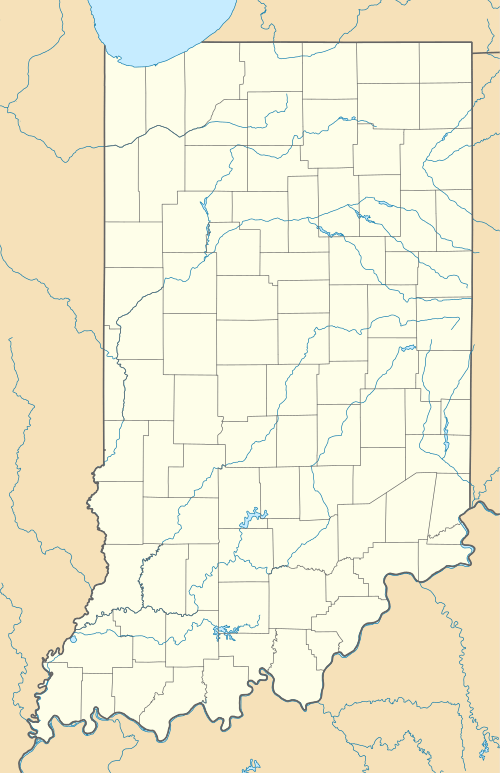New York Central Railroad Passenger Depot, Chesterton, Indiana
|
New York Central Railroad Passenger Depot | |
 | |
  | |
| Location | 220 Broadway, Chesterton, Indiana |
|---|---|
| Coordinates | 41°36′41″N 87°3′16″W / 41.61139°N 87.05444°WCoordinates: 41°36′41″N 87°3′16″W / 41.61139°N 87.05444°W |
| Area | less than one acre |
| Built | 1914 |
| Architectural style | Bungalow/craftsman |
| NRHP Reference # | 98001103[1] |
| Added to NRHP | August 28, 1998 |
Originally built in 1852 for the Northern Indiana and Chicago Railroad a predecessor road of the Lake Shore and Michigan Southern Railway, the wooden structure burned down in 1913. It was replace in 1914 with a brick structure.[2] By 1914, Cornelius Vanderbilt of the New York Central and Hudson River Railroad held a majority interest in the Lake Shore and Michigan Southern Railway. The Southern Railways trackage provided an ideal extension of the New York Central from Buffalo to Chicago. On December 22, 1914, the New York Central and Hudson River Railroad merged with the Lake Shore and Michigan Southern Railway to form a new New York Central Railroad.[3]
The New York Central Railroad, built the new Chesterton Depot out of brick and to the west, across Fourth Street, they built a freight house that same year.[2]
In 1968, the New York Central merged with the Pennsylvania Railroad. In 1976, the Penn Centrals freight service was consolidated into Conrail and it ended passenger service altogether. Passenger service to Chesterton ended in 1964.[4] The rail lines are currently operated by CSX
Architecture
The Passenger Depot is identified in the National Register materials ad Bungalow/craftman, whereas the Indiana State Historic Office (SHP) and Historic Landmarks Foundation of Indiana identify the structure as Spanish Eclectic[5] The Porter County Interim report also identifies the contraction date as 1924.[5] This contradiction with the National Register information may reflect a building upgrade in 1924. The adjacent Freight House retains the Bungalow/craftsman styling, which may be the original style of the Passenger Depot, before 1924.[6]
According to the Indiana Office of Historic Preservation, difference in attributes between these two styles are;
| Bungalow/craftsman architecture[7] | Spanish Eclectic |
| Simple form, usually low side gable roof | Large porch, heavy brick piers or square tapered wood posts |
| Overhanging eaves with simple knee braces | Low pitched roof |
| Natural materials, wood siding, brick, stucco, cobblestone | Clay tile roof |
| Little or no overhanging eaves | |
| Stucco walls | |
| Arches, especially above doors, porch entries or primary windows | |
| Elaborate entryways | |
| Decorative ironwork |
 New York Central Passenger Depot, Chesterton, Indiana (trackside)
New York Central Passenger Depot, Chesterton, Indiana (trackside) New York Central Passenger Depot, Chesterton, Indiana (trackside)
New York Central Passenger Depot, Chesterton, Indiana (trackside) New York Central Freight Depot, Chesterton, Indiana (trackside)
New York Central Freight Depot, Chesterton, Indiana (trackside) New York Central Freight Depot, Chesterton, Indiana
New York Central Freight Depot, Chesterton, Indiana
National Register of Historic Sites
- Chesterton Commercial Historic District
- Chesterton Residential Historic District
- George Brown Mansion
- Norris and Harriet Coambs Lustron House
- New York Central Railroad Passenger Depot, Chesterton, Indiana
- Martin Young House
References
- ↑ National Park Service (2010-07-09). "National Register Information System". National Register of Historic Places. National Park Service.
- 1 2 Railroad Depots of Northern Indiana; Dave E. Longest; Arcadia Publishing; pg 74
- ↑ The Lake Shore and Michigan Southern Railway, Published: 1989 ISBN 9780933449091
- ↑ ’’Brief Snapshots of Chesteron’’; Paula McHugh; The Beacher, weekly Newspaper; Vol 23, Number 9, March 9, 2007
- 1 2 Porter County Interim Report; Indiana Historic Sites and Structures Inventory; Historic Landmarks Foundation of Indiana; July 1991
- ↑ "Indiana State Historic Architectural and Archaeological Research Database (SHAARD)" (Searchable database). Department of Natural Resources, Division of Historic Preservation and Archaeology. Retrieved 2016-06-01. Note: This includes Jim Morrow (March 1997). "National Register of Historic Places Inventory Nomination Form: New York Central Railroad Passenger Depot, Chesterton, Indiana" (PDF). Retrieved 2016-06-01. and Accompanying photographs.
- ↑ "Patoka Lake". in.gov. Retrieved 2014-03-02.
External links
| Preceding station | New York Central Railroad | Following station | ||
|---|---|---|---|---|
Porter toward Chicago | Water Level Route | Burdick toward New York City |

